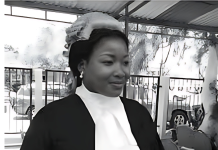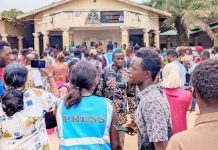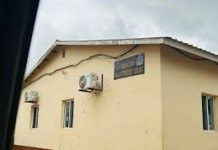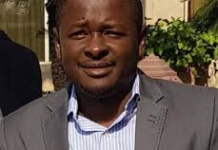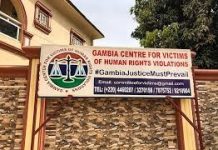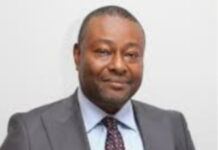By Yankuba Jallow with New Narratives
- Victims Frustrated Over Reparations Delays
- Funding Shortfall Threatens Justice for Victims
- Gambia Warned Not to Repeat Liberia’s Mistakes
Victims of human rights violations in The Gambia are growing increasingly frustrated over delays in processing reparations, which they say are long overdue. While the government has taken steps toward justice, including the establishment of a Special Criminal Division to prosecute crimes from the Yahya Jammeh era, victims say that reparations in the forms of financial compensation and support for their well-being, remain insufficient.
According to the implementation plan proposed in the country’s 2017 Truth, Reconciliation, and Reparations Commission recommendations, recruitment of commissioners and staff of a Reparations Commission should have taken place in the first and second quarters of 2024. The same plan states that the Commission should have been fully set up and equipped within this period.
The government is behind schedule. In the 2025 buget estimates, the Gambia government set aside D30 million for the Reparations Commission whereas D20 million is meant to support victims and D10 million for the Commission’s operational cost. The Finance and Public Accounts Committee of the National Assembly recommended D60 million to fully fund victims reparations. In the 2024 budget estimates, D60 million was budgetted for reparations but it was unused.
Victims are now demanding that the process be fast-tracked. The plan also provides for the commencement of so-called “transformative reparations” for victims from the first quarter of 2025. Transformative reparations are reparative measures that not only address past harms but also aim to reform systemic injustices and empower victims to prevent future violations.
With delays already affecting the setup process, victims fear that the timeline for compensation will also be pushed back.
The truth commission recommended for the compensation of about one thousand victims.
One of the most urgent concerns for the victims’ community is that time is running out. Some of the victims are suffering from severe health conditions resulting from past abuses, yet they remain without financial assistance needed to ease their suffering.
Yusupha Mbye was shot during the April 2000 mass student demonstration by personnel of the Gambia Police Force, which affected his spinal cord. Mbye since then sits on a wheel chair.
“My life has since not been the same. I am always in hospital because my health status is not stable. I need urgent medical treatment,” Mbye said.
Advocates warned that victims are “dying one by one” while waiting for reparations, with others struggling in extremely difficult conditions due to their deteriorating health.
“The most recent case is Bora Colley, who passed away after being detained for months without facing any charges or being brought before a court of law,” Kijera said. “How many more victims must die before the government takes this process seriously?”
For victims who endured torture, sexual violence, and other forms of abuse under the Jammeh regime, the lack of medical support has made daily survival a challenge, they say.
Kijera also criticized the vast difference between the funding allocated for prosecuting perpetrators and the amount set aside for victim compensation. The Gambian government has estimated it will cost $60 million to try perpetrators of international crimes, while just D20 million has been allocated for more than 1,000 victims. “That is a pittance—it is a slap in the face of the victims,” Kijera said. “Victims should be generously compensated compared to what the Minister of Justice is asking for to prosecute a handful of perpetrators.”
Despite the delays, Sirra Ndow, Chairperson of the Victims’ Led Alliance, said that the Reparations Commission is now expected to begin operations on April 1. She said that ensuring victims receive reparations remains the top priority.
“We need to fast-track the process,” Ndow said. “Victims and perpetrators are dying, and this is a cause for concern.” Ndow explained that her organization has been advocating for a more structured and transparent reparations process. She noted that while victims have been involved in transitional justice efforts, many still lack adequate support.
Need more detail on this.. exactly what has been happening. Why is it not transparent?
The recent U.S. aid cut has further complicated efforts to compensate victims. Zainab Baldeh-Lowe, a victim and advocate, said that US funding cuts have affected not just justice efforts but also public awareness campaigns that could help victims access reparations.
“A huge chunk of the work in advocating for justice and accountability cannot be met as expected,” she said. “Victims may lack the necessary information to boost their support in ensuring that the laws are enforced.”
Ida Persson, Special Advisor to the Minister of Justice, acknowledged the difficulties posed by the funding cut but said the government is engaging other partners, including the European Union, African Union, and United Nations, to secure alternative sources of financial support.
“We anticipate that the American government will lift the ban, but in the meantime, we are working to ensure there are no delays in reparations,” she said.
Kijera criticized the government’s heavy reliance on foreign aid, arguing that The Gambia should take greater responsibility for funding the reparations program. He proposed the establishment of a presidential fund dedicated to mobilizing resources for victims. “The government should set up a presidential fund for resource mobilization, just as they did for the Gambia Football Federation,” he said. “More needs to be done to ensure victims receive what they deserve.” Ndow also mentioned that victims are considering generating revenue through visitor payments at the Memory House as an alternative funding source.
“We are ready to support the process, but it needs to move faster,” Ndow said. “Victims have suffered for too long.”
Reparations were recommended by Liberia’s truth commission but 16 years later they’re barely even discussed as part of their transitional justice process. Many of the victims have been suffering since 1990-1993. Sierra Leone’s victims received just $80 each, more than a decade after the end of their conflict. For the Gambia, the victims have received compensation from the truth commission and the Reparations Commission that the government promised to establish will decide how much and what each victim and their families get.
This story was a collaboration withNew Narratives as part of the West Africa Justice Reporting Project.








